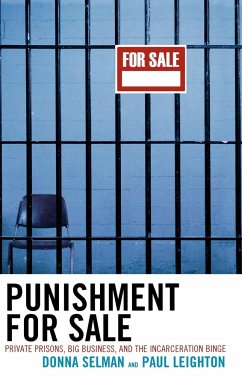Punishment for Sale is the definitive modern history of private prisons, told through social, economic and political frames. The authors explore the origin of the ideas of modern privatization, the establishment of private prisons, and the efforts to keep expanding in the face of problems and bad publicity. The book provides a balanced telling of the story of private prisons and the resistance they engendered within the context of criminology, and it is intended for supplemental use in undergraduate and graduate courses in criminology, social problems, and race & ethnicity.
Selman and Leighton have presented a cogent summary of the connection between the free market mentality that dominates American society and the use of imprisonment as a solution to the problem of crime. As the authors show so clearly, while crime may not pay, punishment certainly does, as it is a very profitable enterprise. The methodology is unique, as they review Congressional testimony, Securities and Exchange Commission filings, and the contracts of Corrections Corporation of America and the GEO Group have made with state and local governments. This book will leave its mark and future researchers on the American penal system will have to use it as a major source. -- Randall G. Shelden, University of Nevada-Las Vegas, author of Our Punitive Society: Race, Class, Gender and Punishment in America With a reputation for pursuing social justice, Selman and Leighton expose the realities and consequences of privatized prisons. Punishment for Sale deserves to become standard reading for professors, students, and activists concerned about the expanding neoliberal campaign to outsource criminal justice -- Michael Welch, Rutgers University The dramatic growth of the US prison population in recent times has been an especially noteworthy-and troublesome-development within the criminal justice system. Although some criminologists believe that the high level of incarceration has contributed to the declining conventional crime rate since the early 1990s, other criminologists have documented some of the harmful consequences of this trend. Criminologists Selman and Leighton (both, Eastern Michigan Univ.) focus upon the role of private prisons in'America's incarceration binge.' Applying an analytical framework that comes out of critical criminology, the authors systematically explore the Reagan era origins of the increasing shift to the privatization of corrections, the key factors contributingto its expansion, and the consequences. The pursuit of profit in a 'prison-industrial' complex does little to stop crime, but greatly amplifies injustices imposed upon disadvantaged segments of society. The authors show private prison industry executivesto be exorbitantly compensated and accordingly highly motivated to promote by any means possible-including harsh laws directed at immigrants and drug users-the number of convicted offenders sent to prison. An important and timely book. Highly recommende CHOICE, November 2010 An important book that sheds new light. Using Congressional testimony, SEC filings, and copies of actual contracts obtained through the Freedom of Information Act, Punishment for Sale documents the heedless profiteering of neo-liberal prison firms that fails taxpayers, criminal offenders and the American people. The explicit class analysis offered here, documents how the AIG-style mentality of corporate America has once again capitalized upon our refusal to honestly address the sources of crime, prefering instead, to profit handsomely from its existence. As Selman and Leighton so aptly put it: "In this case, the rich get richer by way of the poor getting prison." Required reading. -- Michael Hallett, University of North Florida The dramatic growth of the US prison population in recent times has been an especially noteworthy-and troublesome-development within the criminal justice system. Although some criminologists believe that the high level of incarceration has contributed to the declining conventional crime rate since the early 1990s, other criminologists have documented some of the harmful consequences of this trend. Criminologists Selman and Leighton (both, Eastern Michigan Univ.) focus upon the role of private prisons in 'America's incarceration binge.' Applying an analytical framework that comes out of critical criminology, the authors systematically explore the Reagan era origins of the increasing shift to the privatization of corrections, the key factors contributing to its expansion, and the consequences. The pursuit of profit in a 'prison-industrial' complex does little to stop crime, but greatly amplifies injustices imposed upon disadvantaged segments of society. The authors show private prison industry executives to be exorbitantly compensated and accordingly highly motivated to promote by any means possible-including harsh laws directed at immigrants and drug users-the number of convicted offenders sent to prison. An important and timely book. Highly recommended. CHOICE, November 2010







